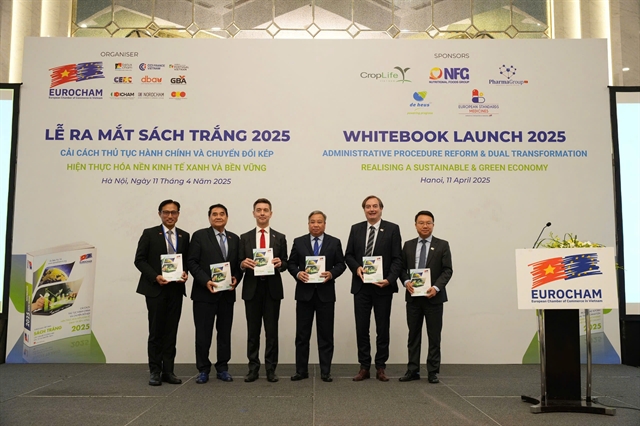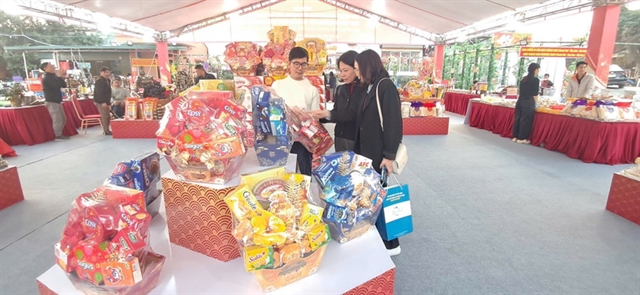 Economy
Economy

 |
| Delegates at the Whitebook launch on Friday. — Photo courtesy of the organiser |
HÀ NỘI — As Việt Nam navigates through the global economic turbulence, the European Chamber of Commerce in Việt Nam (EuroCham) has released its 2025 Whitebook—an influential policy document setting out what it calls 'Must-Win Battles' essential to the country’s sustainable growth and long-term competitiveness.
Launched in Hà Nội on Friday morning, with high-level representation from Government officials, the diplomatic corps and the private sector, the Whitebook 2025 provides an urgent call for action amid mounting geopolitical tensions, global trade realignments and Việt Nam's own economic aspirations.
This year’s Whitebook marks a shift toward strategic alignment and cross-sectoral cooperation, in pursuit of a greener and more resilient Vietnamese economy.
At the core of the Whitebook is a new cross-cutting framework that identifies five foundational reforms: entry visa policies, immigration and airport infrastructure, work permits, VAT refunds and customs procedures. These areas, long-standing bottlenecks for foreign businesses, are now framed as urgent policy priorities.
By streamlining administrative processes and addressing regulatory friction, EuroCham said that Việt Nam can significantly boost investor confidence and operational efficiency.
“Việt Nam’s future economic trajectory depends on decisions made today,” said EuroCham Chairman Bruno Jaspaert at the launch.
The Whitebook is more than a set of recommendations, it’s a compass, he said, adding that it offers pragmatic, business-driven solutions that reflect the realities on the ground.
In addition to macro-level reforms, EuroCham’s 19 Sector Committees have contributed targeted recommendations in high-impact areas such as green finance, semiconductor supply chains, EV infrastructure, pharmaceutical regulations and sustainable agriculture. Each recommendation is backed by empirical input from member companies, ranging from dynamic small and medium sized enterprises (SMEs), through to multinational corporations.
With Việt Nam aiming for eight per cent GDP growth in 2025, the challenge lies in executing reforms that not only maintain growth, but also ensure environmental and social sustainability.
The Whitebook thus advocates for integrating global best practices in legal and environmental governance—an alignment that will be essential for Vietnam to meet both its domestic targets and international obligations under trade and climate frameworks.
.jpg) |
| EU Ambassador to Việt Nam Julien Guerrier speaks at the event. — Photo courtesy of the organiser |
Strengthening the Việt Nam - EU partnership
The timing of the Whitebook’s release is significant. This year marks the fifth anniversary of the Việt Nam - EU Free Trade Agreement (EVFTA), a landmark deal that has catalysed growth in bilateral trade and investment.
Speaking at the event, EU Ambassador to Việt Nam Julien Guerrier emphasised the EU’s long-term commitment to open and fair trade.
"Free and fair trade is in Europe’s DNA and is the backbone of our prosperity and competitiveness. The EU is determined to work with partners, and with Việt Nam, in responding to the new reality for the global economy,” said Ambassador Guerrier.
"The EVFTA has clearly demonstrated how trade and investment flows can grow when we build on a solid framework. We must make full use of this agreement to unlock its full potential.”
The 2025 Whitebook launch comes amid heightened economic anxiety due to global trade disruptions and shifting supply chains. Despite these headwinds, EuroCham’s first quarter of 2025 Business Confidence Index indicates steady investor interest.
However, the findings underscore the need for responsive governance and clear legal frameworks to avoid an erosion of foreign direct investment (FDI).
EuroCham experts brought forward direct insights from the business frontlines, offering practical recommendations to support Việt Nam’s sustained prosperity. One message rang loud and clear throughout the room: the time to act is now.
Việt Nam possesses key advantages—a strategic location, demographic strength and it is rich natural resources. But to fully capitalise on these, it must act decisively to eliminate inefficiencies and build a transparent, resilient investment environment. — BIZHUB/VNS




